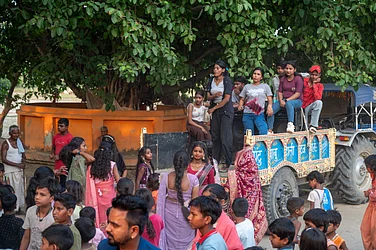Addressing an event at Bhabua in Kaimur district, Bihar Chief Minister, Nitish Kumar on Sunday rejected the need for a population control law in India citing that it would have negative implications and asserted that those advocating for such laws are merely indulging in 'foolish talk'.
“Population control law should never be enacted. There is no need. Those advocating such legislation are indulging in foolish talk,” he said.
Kumar also spoke about the need of a stronger and larger opposition in the country at the event. He said that talks for the formation of a big platform of opposition parties will take place upon the conclusion of Rahul Gandhi's Bharat Jodo Yatra.
Interacting with media reporters earlier on his state-wide Samadhan Yatra, Kumar said, “Once the Congress’ own programme concludes, we will start talks on larger opposition unity. I surely feel we need all opposition parties should come together on a common platform”.
Referring to the failures of a population control law in China's context, the Bihar CM said that one should take reference and understand the negative effects of such laws in a huge and populous country. He further highlighted the problems followed by China's one-child policy and how it later prompted the country to encourage its citizens to have two children. “Now China is promoting three child norm,” he added.
Citing the failure of such in law in a huge and populous country such as China, the chief minister highlighted that the negative effect of population control law could be well understood by looking at China, where a one-child policy had its problems, and it prompted the country to encourage people to have two children. “Now China is promoting three child norm,” he said.
Nitish Kumar also underlined the importance of female education and its relation with reduced fertility rates which contribute to a nation's controlled population. Adding that educating girls is the elixir to balance a population, he said“In Bihar, the fertility rate was reduced to 2.6% from 4.6%. This is because girls are getting more education. In the next few years, it will reduce more to 2%.”




















.png?w=200&auto=format%2Ccompress&fit=max)





